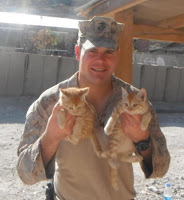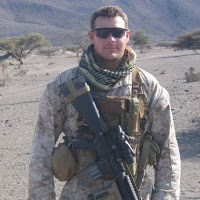Former Marine helps vets adjust to life after war
 |
| Travis Hall |
Travis Hall has faced some challenges adjusting to civilian life after serving in the Marines in Afghanistan – and he wants other veterans to know there are organization out there are bringing vets together to help them cope.
Hall was able to get his life back on track after attending workshops presented by the nonprofit organization Project Welcome Home Troops. “It changed my life,” he says. Hall now co-teaches and organizes workshops for veterans throughout Northern Virginia.
The organization provides veterans with the tools to manages stress and strengthen their resilience through breathing exercises, yoga, meditation, and group discussions.
Hall, a resident of Fredericksburg, grew up in Annandale and went to Annandale Terrace Elementary School, Poe Middle School, and Annandale High School. He enlisted in the Marines and was deployed overseas after he graduated from college. Noting that his family has many military members, he says, “It’s in my blood. It’s something I always wanted to do.”
“This is what patriots do in times of conflict,” he says. “Politics doesn’t matter. It’s about doing the right thing.”
Hall served as a staff sergeant in the Horn of Africa, Morocco, Australia, and Germany, as well as Afghanistan. He is currently in the reserves and works for the Navy as a civilian in staff operations.
“I had a pretty rough time when I came back after Afghanistan. There were casualties I felt responsible for,” Hall says. “There were things I was holding onto that I didn’t realize.” It didn’t help that his wife divorced him soon after he returned to the States.

Hall was in counseling, worked out a lot, and did yoga, but “I still had issues,” he says, although he was never clinically diagnosed with PTSD.
After attending his first five-day Welcome Home Troops workshop, in 2014 in Aspen, Colo., “I felt so much better,” he says. “I was able to sleep at night. I wasn’t carrying around the weight of the world. I felt I had control over some things, and other things were out of my control.”
The workshops are free of charge and are open to any veteran, active duty military member, reservist, and military spouse.
Hall also reaches out to other local veterans through the Irreverent Warriors organization, which uses dark humor and camaraderie to help vets fight depression.
Many of the vets he knows feel isolated. “No one knows what they’ve been through,” Hall says.
Irreverent Warriors is not about raising awareness, Hall says. “Raising awareness without action doesn’t do anything. Not that many people care; so many Americans are disconnected from the military.”
Hall joined a group of about 50 to 60 vets from different branches of the military recently on an Irreverent Warriors-sponsored 22-kilometer “silkies hike,” where veterans wear military-style undershorts known as “silkies” while carrying a 22-kilo pack. That’s about 13.5 miles hauling 40 pounds.
The number 22 is significant, Hall says, because of a flawed, but widely reported, study that said 22 veterans commit suicide every day. That statistic is exaggerated, he says, but, “regardless of how many there are, suicide is a serious problem among veterans.”
Being a part of that hike “made me feel I was part of something, It was great meeting other local vets,” Hall says. Walking by the site of Civil War battlefields around the Fredericksburg area “reminded us of the combat and tragedy that happened there.”
During the hike, Hall’s boots, which he’d worn on five continents, totally fell apart. “I didn’t want to go home,” he recalls. “Finishing the hike meant a lot to me.” So he kept walking barefooted – and that turned out to be really inspiring for the other vets.
Hall appears in a documentary film, “Almost Sunrise,” that stars a friend of his, Tom Voss, an Iraqi war veteran he met at a Welcome Home Troops workshop. Voss had a mortal injury, severe PTSD, and was on the verge of suicide.
A film crew documented the epic journey undertaken by Voss and fellow vet Anthony Anderson as they walked 2,700 miles from Wisconsin to Los Angeles. The film was screened at the Telluride Film Festival in Colorado and the AFI Docs festival in Silver Spring, Md., in June.
“It’s a really important film,” Hall says. “It shows a different side of veterans that most films fail to capture. Most people have the view that we are weak and we are victims.”
“In reality, veterans are not weak people. We’ve been through a lot of stuff, but we can deal with it,” he says. “If you fought in a war, that looking back you don’t believe in anymore, and lost friends, it’s tough to reconcile that in your head.”
“We can be productive members of society,” he says. “We’re not broken; we’re not messed up people. I’m more emotionally and mentally stable than I’ve ever been in my life – and more fit emotionally and mentally than most Americans,” he says.
“I have plenty of friends who didn’t serve. I have no issue with that,” he says. “I only have problems with people who think lesser of us because we did serve.”

